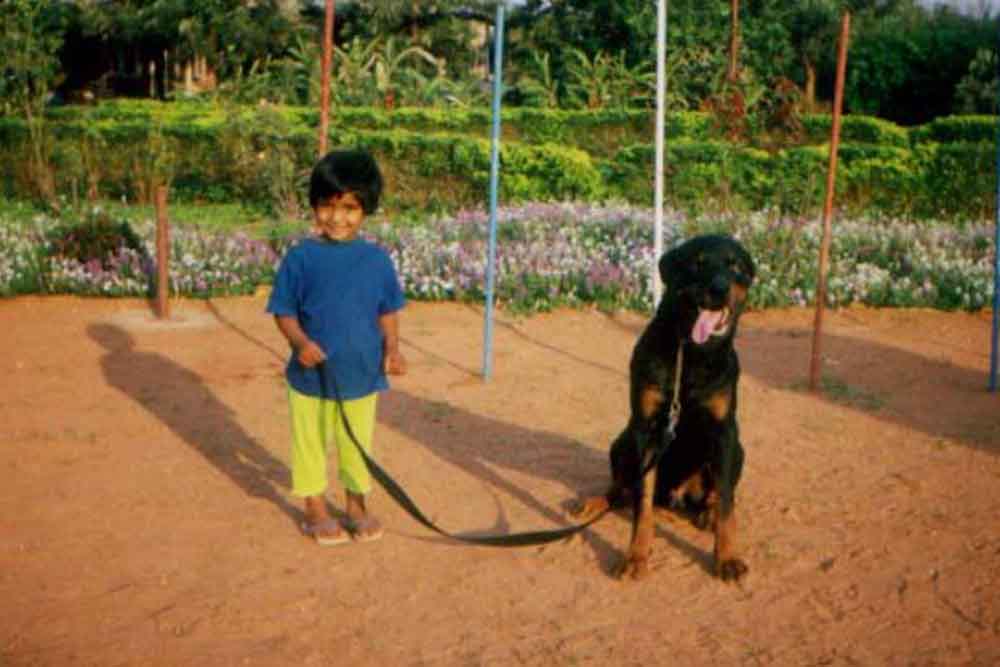As a seasoned canine professional, I have had the privilege of working with various dog breeds throughout my career. Among these, Rottweilers hold a special place. Their intelligence, strength, and loyalty make them standout companions when trained correctly. In 1998, I had the distinct honor of training a Rottweiler that scored a perfect 170/170 in a Kennel Club of India (KCI) companion dog competition. This experience, among many others, has shaped my understanding of this remarkable breed.
The Rottweiler – A Brief Overview
The Rottweiler breed has a storied history that traces back to the Roman Empire, originally bred to herd livestock and pull carts for butchers. These dogs were valued for their strength, endurance, and reliability, qualities that eventually made them popular as police, military, and service dogs. This transition speaks to their intelligence and versatility, which are hallmarks of the breed.
In terms of physical characteristics, Rottweilers are medium-to-large, muscular dogs, known for their robust build. They have a distinctive black coat with rust to mahogany markings, broad heads, and well-developed jaws. Despite their formidable appearance, Rottweilers can move with surprising grace and agility.
The temperament of a Rottweiler, often misunderstood, is actually one of the breed’s strongest points. These dogs are intensely loyal and protective of their families, forming strong bonds. This loyalty, while admirable, does need responsible management to prevent overprotectiveness. Rottweilers typically exhibit a calm and confident demeanor, not easily unsettled by disturbances. They are highly intelligent and trainable, responding well to obedience, tracking, and working roles. In family settings, Rottweilers are affectionate and gentle, often forming a close bond with one particular family member. They are usually reserved around strangers, highlighting the importance of early and ongoing socialization to help them become well-adjusted adults.
Rottweilers are among the most trainable dog breeds, thanks to their keen intelligence and desire to please. They respond exceptionally well to positive reinforcement, making training sessions enjoyable and effective. However, to develop into well-adjusted adults, they require early socialization and consistent training. They are capable of advanced training and excel in various roles, including search and rescue, therapy work, and competitive obedience. While eager to learn, Rottweilers also need consistent and firm guidance in training. The approach should be assertive but never harsh, establishing the owner’s role as a leader.
There are common misconceptions about Rottweilers that often paint them in a negative light. The belief that they are inherently aggressive is unfounded and typically stems from irresponsible ownership, neglect, abuse, or a lack of socialization and training. Another myth is that Rottweilers are difficult to manage, which is not the case when they are given proper training, socialization, and exercise.
Training Rottweilers – The Role of Positive Reinforcement
Training Rottweilers effectively requires an understanding of their unique temperament and needs. In my experience, the most successful method of training these robust dogs is through positive reinforcement. This approach hinges on the principle of rewarding good behaviour, thereby encouraging the dog to repeat it. At our training facility, we have seen firsthand how Rottweilers thrive under this method.
Positive reinforcement in training Rottweilers involves using treats, praise, or play to encourage and reinforce desirable behaviours. When a Rottweiler performs a command correctly or behaves in a socially acceptable manner, a reward is given. This could be a favourite treat, a word of praise, or a short play session. This method is particularly effective with Rottweilers due to their desire to please and their responsiveness to affection and attention from their handlers.
In our training sessions, we focus on building a bond of trust and mutual respect with the Rottweilers. This relationship is fundamental to any successful training program. When a Rottweiler trusts its trainer and feels respected, it is more inclined to learn and follow commands. We reward desirable behaviours promptly, ensuring that the dog understands precisely what action has earned it a reward. This clarity helps in reinforcing good behaviours consistently.
Conversely, when a Rottweiler exhibits an unwanted behaviour, we employ gentle redirection rather than punishment. This might involve diverting the dog’s attention to a more appropriate activity or calmly repeating a command until the desired behaviour is achieved. Such a method ensures that the dog does not become fearful or anxious, which can be counterproductive to learning.
This method of training through positive reinforcement has proven to be incredibly effective at our facility. Not only does it enhance the dog’s learning experience, but it also fortifies the bond between the dog and its trainer. Rottweilers trained using this method have demonstrated remarkable improvements in behaviour, obedience, and social skills. They become well-adjusted dogs, capable of forming strong, positive relationships with their human counterparts. The success we’ve witnessed reinforces the belief that positive reinforcement is not only a kinder approach to dog training but also a more effective one, particularly with breeds like the Rottweiler.
Exercise – Vital for Physical and Mental Health
Rottweilers are an active breed that requires regular exercise to maintain their physical health and mental well-being. A lack of physical activity can lead to boredom, which in turn can result in destructive behaviours. Daily walks, play sessions, and the opportunity to run and explore in a safe environment are essential. Mental stimulation is crucial for Rottweilers. They are intelligent dogs with a keen ability to learn and solve problems. Training sessions, interactive toys, and games that challenge their minds are excellent ways to keep them engaged. Teaching new commands, practicing obedience skills, and even participating in dog sports can provide valuable mental stimulation.
Socialization from a young age is paramount for Rottweilers. Exposure to various people, environments, sounds, and other animals helps them become well-adjusted adults. Proper socialization reduces the likelihood of fear-based aggression and helps the dog develop confidence and sociability.
The myth that Rottweilers are naturally aggressive and untrainable is far from the truth. With consistent, positive reinforcement-based training, they can be incredibly obedient and reliable. Their perceived aggression is often a result of poor training, lack of socialization, or mistreatment.
In my professional journey, I have encountered numerous Rottweilers with varying temperaments. Each one, when given the appropriate training and care, has shown the capability to be a loving, loyal, and well-behaved companion. The key is to understand their needs, provide structured training, and treat them with kindness and respect.
Rottweilers, with their impressive strength, intelligence, and loyalty, are a remarkable breed. They thrive under positive reinforcement training, benefit greatly from both physical and mental exercise, and require early socialization to develop into well-rounded dogs. As a canine professional, I can attest to their trainability and gentle nature when raised in a loving, structured environment. It’s time we move past the stereotypes and recognize the true potential of these magnificent dogs.
[Philip Butt is CEO of Commando College for Dogs and Trainers and creator of the ‘Positive Behaviour Modification System’TM . With operations in Hyderabad, they regularly conduct international certified training courses for dog trainers, in conjunction with the Obedience & Agility Club and The Hyderabad Canine Club. He is also a KCI Obedience judge and can be reached on philip@commandokennels.net.in]




